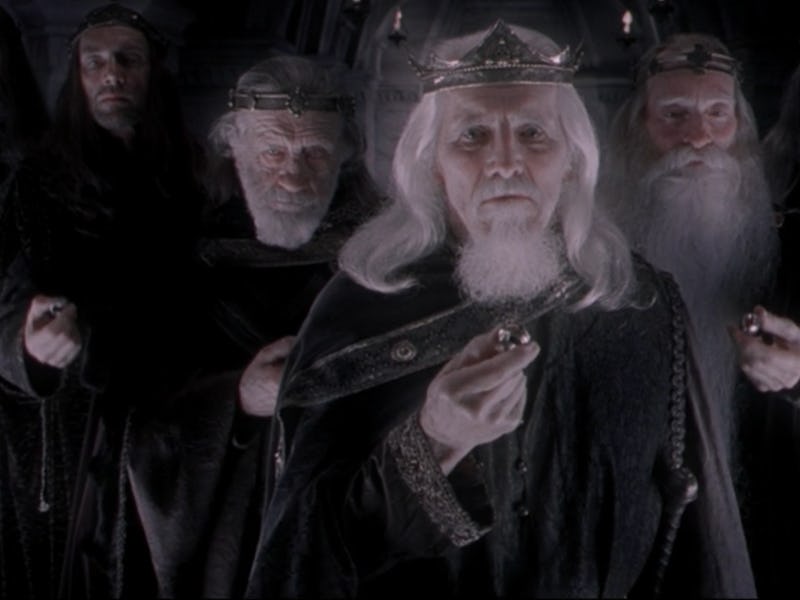Rings of Power title reveal video Easter egg sets up a game-changing Lord of the Rings disaster
“Nine for Mortal Men doomed to die.”

Very little has been officially released about The Lord of the Rings: The Rings of Power. The highly anticipated Amazon series is set to serve as a prequel to the Lord of the Rings trilogy and will take place thousands of years before Bilbo Baggins ever stumbled upon the One Ring.
But aside from its setting and the general knowledge they have about the Second Age of Middle-earth, Lord of the Rings fans still don’t have much information about the actual plot of The Rings of Power. Even the video Amazon released with the show’s title reveal offers few details.
That said, the video does include a subtle reference to one epic moment that The Rings of Power is expected to bring to life on-screen for the first time.
Doomed to Die — The title announcement video for The Rings of Power depicts the literal forging of the show’s logo and is narrated by an unidentified speaker (likely Morfydd Clark’s Galadriel), who recites part of the Ring Verse. The poem describes the creation and distribution of the 20 Rings of Power, beginning with those made for the Elves, Men, and Dwarves.
Notably, when the narrator says, “Nine for Mortal Men doomed to die,” the video shows a rush of water flooding the show’s logo. That’s a clever, easy-to-miss Easter egg referencing the catastrophic destruction of the island kingdom of Númenor.
A map of Númenor.
Drowned Beneath the Sea — Númenor is an island gifted to the Edain, the Fathers of Men, by the Valar (the celestial beings of Tolkien’s world) for their efforts in helping the Elves at the end of the First Age of Middle-earth. And in the centuries after its creation, Númenor rises to be a truly mighty force, so much so that even Sauron grows afraid of the Númenórean armies.
However, Númenor was a gift given with one important caveat: The Númenóreans were never allowed to sail West toward the Undying Lands, as no mortal Men are allowed to step foot on the shores of Valinor. For many centuries, the rule is respected. It’s only when the Kings of Númenor grow prideful and bitter over being denied the same immortality as the Elves that the Valar’s decree becomes a point of conflict among the Númenóreans.
It’s a sore spot that Sauron exploits. Turning himself over to the Númenóreans a little over 3000 years into the Second Age, Sauron poisons the minds of the Númenórean king and his followers, and corrupts them into believing they can take immortality by force. His deception leads to the Númenórean army sailing West until they reach the Undying Lands, intent on forcing the Valar into giving them eternal life.
As you might imagine, the conquest fails. The Valar call upon the creator of the universe, who responds to the Númenóreans’ arrogance by sinking Númenor and its citizens beneath the sea. Only a few Númenóreans survive their kingdom’s destruction, some of whom go on to found Gondor.
Minas Tirith, a city founded by exiled Númenóreans, as seen in Lord of the Rings: The Return of the King.
The Inverse Analysis — To say that the story of Númenor and its destruction is epic would be an understatement. It has the potential to be a cinematic TV moment on the same level as something like The Wall coming down in Game of Thrones. It’s the ultimate tragedy, and the moment in which Sauron’s ability to manipulate the minds of Men becomes clear.
In other words, it definitely feels intentional that water floods the screen in the Rings of Power title announcement video at the exact moment its narrator mentions “Mortal Men” who are “doomed to die.”
The Lord of the Rings: The Rings of Power premieres September 2, 2022, on Amazon Prime.
This article was originally published on